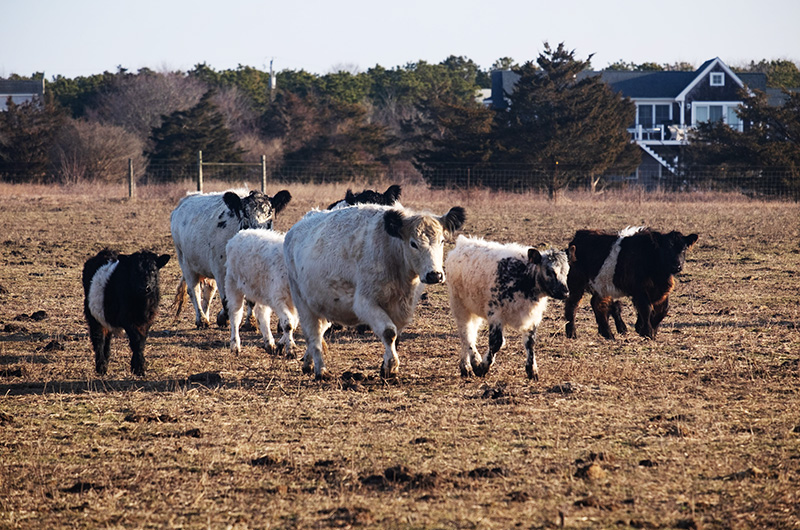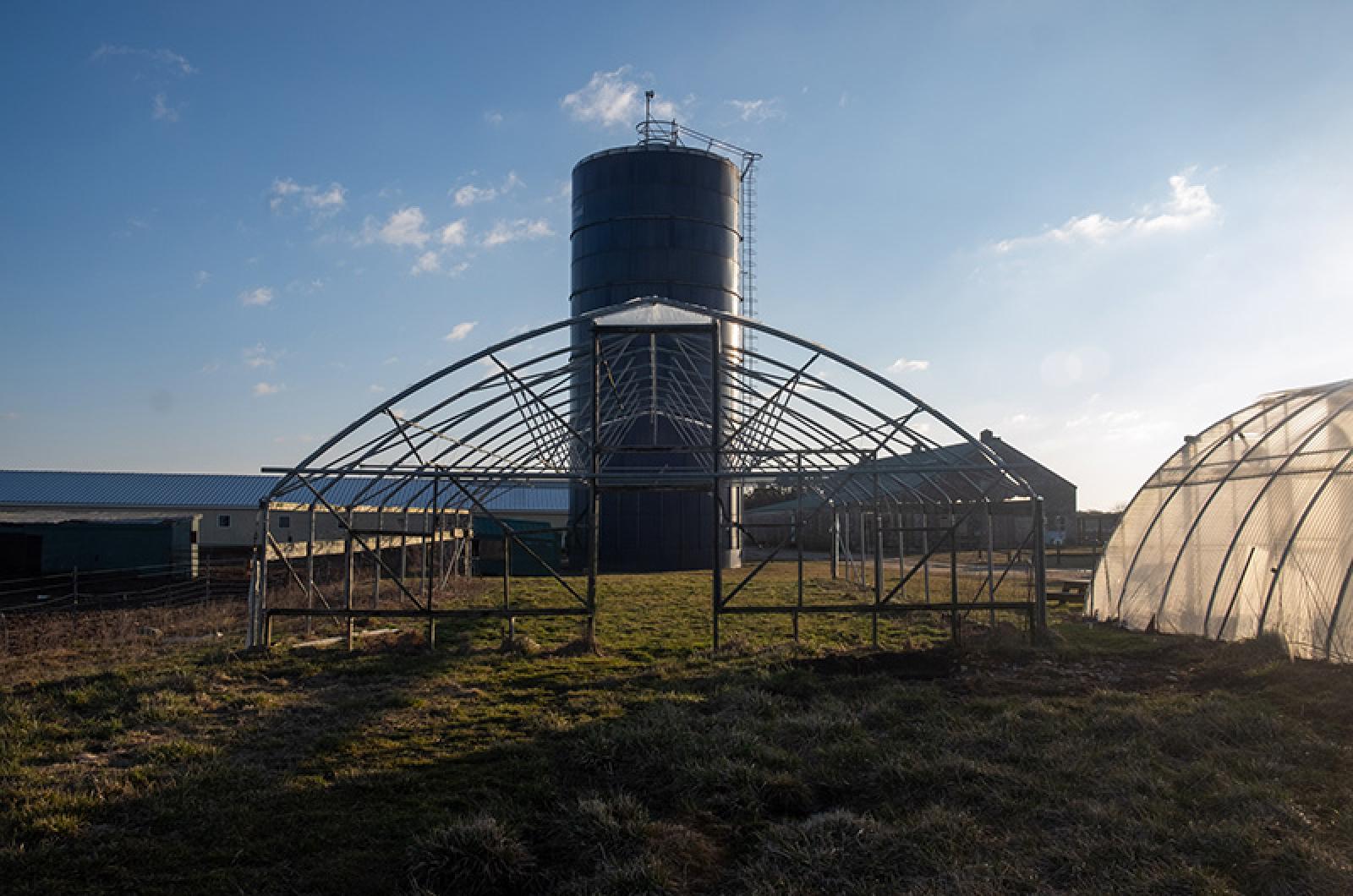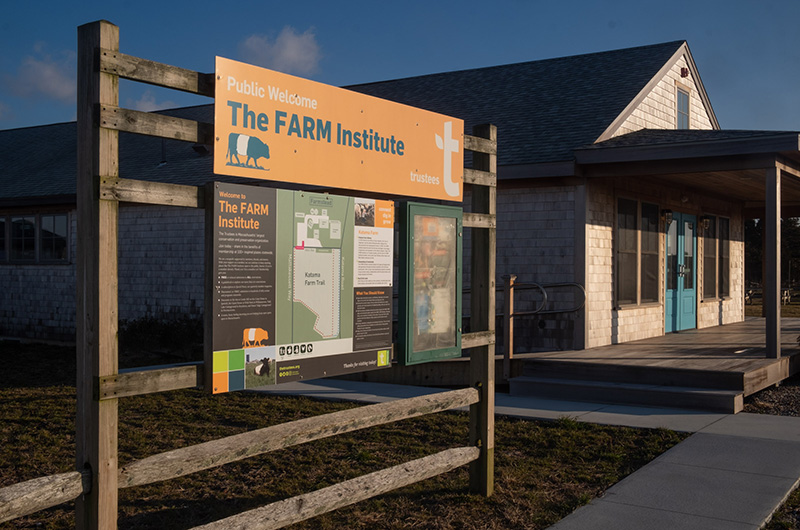Tensions over the use of prime town-owned Katama farmland by the Trustees of Reservations came to a head before the Edgartown conservation commission this week, with the commission threatening to sever its lease with the Farm Institute if it does not quickly come into compliance.

The Trustees, a Massachusetts land conservancy with seven properties on Martha’s Vineyard from Menemsha to Cape Pogue, took over the nonprofit Farm Institute and lease for the 182-acre farm in 2016. The lease runs for 30 years at a rate of $12,500 per year. The conservation commission is the landlord for the property, whose history as a working farm dates to a previous century.
In recent months, according to the conservation commission, the Trustees has winnowed the livestock population, removing approximately 20 breeding cows from the farm, let go of a full-time farmer and proposed a change of use for the property that would take about 60 acres of grazing land out of agricultural use in order to protect a rare grasshopper sparrow population.
The Trustees have attempted to frame the issue as a balancing act between conservation and agriculture. But the conservation commission has pushed back vigorously against the suggestion, noting that the town manages other rare conservation lands at Katama, and that Katama Farm was in fact set aside nearly 50 years ago for use as a working farm. That purpose is spelled out in the lease with the Trustees.
Minutes from conservation commission meetings early this year reflect the tension.
“The commission leased the land to the Trustees in order to have a vibrant, working farm with a consistent — not a token — livestock presence,” minutes from a Jan. 24 meeting state. “ . . . if the Trustees’ are finding the operation [not] economically viable, they should consider terminating the lease.”
At a conservation commission meeting Wednesday, Kevin Channell, director of agricultural operations for the Trustees, sought to cool the heat. He said removal of the cattle is only for this year and that the farm would take steps to adapt its use agreement to fit with the shared goals of the Trustees and the town. He promised to have a new draft agreement available by next week.
“[Farming] is our full intention,” Mr. Channell said. “As far as the current use plan, we would like to make some minor adaptations to it. But it will be in keeping with the spirit and intent of the original use plan.”
He promised that the Trustees would staff the farm in the interim, and said they plan to look for a new farmer.
In a subsequent phone conversation, Edgartown conservation agent Jane Varkonda said the change of use occurred without the commission’s knowledge and violated the spirit, if not the letter, of the lease. She said issues with the Trustees management of the farm go back for some time, with the recent changes sparking fresh pique among commissioners.
“They did not talk to us before implementing a major change at the farm,” Ms. Varkonda said. “They sent off animals without telling us, and did not get prior approval from their landlord . . . We’ve had issues with them for the past two summers.”
The 2016 agreement between the town and the Trustees/Farm Institute spells out the expected use of the land.
“The long use of the Katama plains for agriculture has been well-documented,” it says in part. “TFI and the Trustees’ honor this legacy by continuing to farm the land, primarily as a livestock operation, while maintaining trails, signage and encouraging conservation practices.”
When the agreement was signed, the Trustees had 65 head of cattle, including 22 breeding cows, over 100 sheep (45 ewes), 300 laying hens, a pair of breeding pigs and 70 turkeys for Thanksgiving, as well as assorted rabbits and a special duck. The agreement states that the total animals put them at about 80 per cent of their livestock capacity.
Ms. Varkonda said she toured the farm on Monday, and found approximately 26 cows, 26 chickens, six sheep, five goats, five ducks and two rabbits. She said the farm has cut back on its poultry business and did not harvest turkeys for Thanksgiving this year.
Ms. Varkonda said town counsel has been notified of the situation.
She also said the Trustees have been using the farm’s barn as a storage space for beach vehicles used at Norton Point for the past two years, despite repeated requests from the town to remove the vehicles.
Sam Hart, the Islands’ director for the Trustees who attended the meeting Wednesday, said the vehicles have been removed. He and Mr. Channell both said the removal of the animals would be temporary and seasonal.
The town bought Katama Farm in the late 1970s when developers were threatening to turn the globally-rare remnant of the Great Plains with its rich loamy topsoil into a 700-lot subdivision. Over the years, the farm has had an eclectic assortment of tenants, including dairy and beef operations.
Originally established as an educational nonprofit dedicated to livestock farming and teaching, the Farm Institute began leasing Katama Farm from the town in 2003. In 2016 the institute, which was struggling financially, merged with the Trustees, which subsequently took over the lease with the town. Recently the Trustees installed a kitchen addition. The property is used for summer fundraising events as well as farming activities.
The most recent dispute between the Trustees and town began in September, when the Trustees contacted the state Division of Fisheries and Wildlife to notify them of the presence of rare grasshopper sparrows on the property. Although agricultural land is exempt from state endangered species rules, state ecologist Julie Richburg wrote that care should be nonetheless be taken to avoid harm to the tiny sparrows.
In a Jan. 17 letter to the town, Mr. Channell outlined “production scale changes” on the farm due to concerns about grazing ruminants on the sparrow habitat, and the resulting expense of importing high-quality hay for farm animals. The letter described plans to cut back on livestock production and let a large area lie fallow.
“The change in production scale year-round activity is one that is difficult to accept for all of us, but also one that is necessary for the ecological and economic realities we are facing,” the letter concluded.
The letter prompted a stern reply from Ms. Varkonda and the commission, who chastised the Trustees for reaching out to state environmental officials without their knowledge, expressly noting that the land was exempt from any endangered species act concerns. Ms. Varkonda also said the claims about economic viability were misguided.
“It’s land under agriculture, it’s exempt from MESA regulations,” Ms. Varkonda told the Gazette Thursday. “We manage Katama airfield and many other properties for habitat. And Katama Farm was bought for agricultural purposes.”
In addition to Katama, the Trustees own 2,000 acres of farmland across the state, including three farms: Powisset Farm in Dover, Appleton Farm in Hamilton and Ipswich, and Weir River Farm in Hingham.
At the time of its merger with the Farm Institute, executive director Barbara Erickson said the Island farm would fit snugly among those other properties.
“Our organization is heavily invested in food systems, and not only bringing local food to people but supporting sustainable farms in our state,” she said. “We were really heartened and inspired by the programming at the farm.”
On Wednesday, Mr. Channell walked back many of the previous plans, and said he had received a subsequent letter from the state that would free the Trustees from many of the concerns surrounding the sparrows, therefore allowing them to farm.
But the trust between the conservation organization and their landlord clearly had been shaken.
“It feels like you were trying to manipulate a bunch of land into another land use other than that which had already been established,” commissioner Jeff Carlson said. “You have to understand that makes us a little skeptical, and there’s a trust factor that we’re not really sure about in regards to this.”








Comments (39)
Comments
Comment policy »